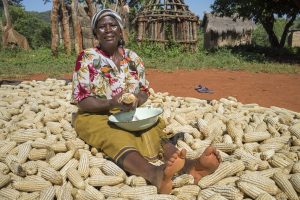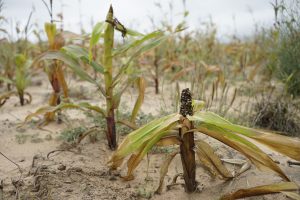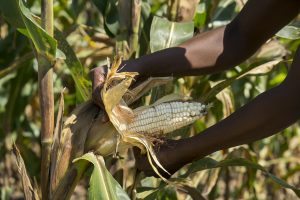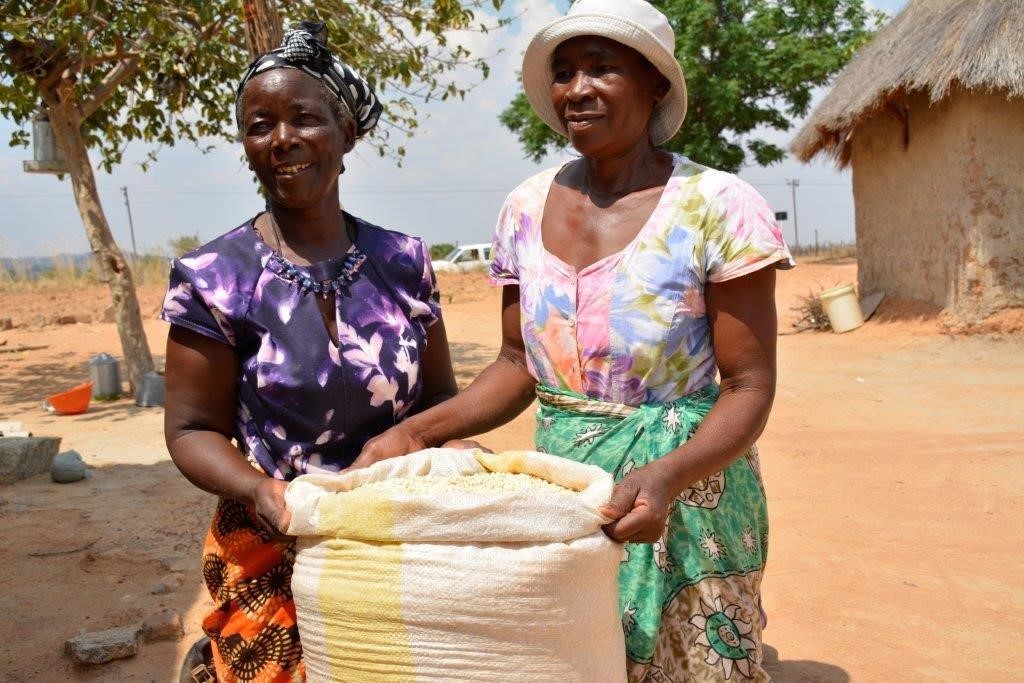
A new study from scientists with the International Maize and Wheat Improvement Center (CIMMYT) shows that drought tolerant (DT) maize varieties can provide farming families in Zimbabwe an extra 9 months of food at no additional cost. As climate change related weather events such as variable rainfall and drought continue to impact the southern African nation at an increasing rate, these varieties could provide a valuable safety net for farmers and consumers.
The study found that households that grew DT maize were able to harvest 617 kilograms more maize per hectare than households that did not grow DT maize varieties. This translates into $240 per hectare extra income for households that grow DT maize varieties, equivalent to 9 months’ worth of additional food security.
As 93 percent of households surveyed grow improved maize varieties using seed purchased from local markets, this shows that by switching to DT varieties local farmers could greatly improve their livelihoods and food security at no additional cost. Currently, only 30 percent of households surveyed grow DT varieties.

Drought is a major limiting factor for maize production and can reduce maize yields by up to nearly 40 percent. In the past 10 years, most farmers in southern Africa have experienced around 1–3 drought years, potentially due to climate change. However, Zimbabwean farmers reported 4–5 years of drought in the past 10 years. Adoption of drought-tolerant maize varieties by farmers is crucial to maintaining food security in the region. Studies have shown that CIMMYT DT maize varieties can increase yields by 40 percent under severe drought conditions compared to local commercial varieties.
The production and productivity of maize in Zimbabwe have been decreasing since the early 1990s, taking the country from its role as a surplus producer of maize to a net food importer. Climate change is contributing significantly to this decline, as Zimbabwe is particularly vulnerable to climate change due to its dependence on rain-fed agriculture. The study’s authors recommend an increase in the promotion and production of DT maize in order to help reverse this trend and help smallholder farmers in Zimbabwe mitigate the effects of climate change while increasing maize production and yield.

This research was conducted under the Drought Tolerant Maize for Africa (DTMA) project. Jointly implemented by CIMMYT and the International Institute of Tropical Agriculture (IITA) with funding from the CGIAR Research Program on Maize (MAIZE), the project worked to mitigate drought and other constraints to maize production in sub-Saharan Africa through improved drought-tolerant maize varieties. Millions of farmers in the region benefited from the outputs of this partnership, which included support and training for African seed producers and the promotion of vibrant, competitive seed markets. The project ended in 2015, but DTMA varieties continue to be promoted through the Stress Tolerant Maize for Africa (STMA) project, which will work to develop 70 additional new improved stress-tolerant varieties using innovative modern breeding technologies.
Read the full study here.
Impact of adoption of drought-tolerant maize varieties on total maize production in south Eastern Zimbabwe. 2017. Lunduka, R.W., Mateva, K.I., Magorokosho, C., Manjeru, P. In: Climate and Development, DOI: 10.1080/17565529.2017.1372269
Zimbabwe indicated its intentions to “promote the use of indigenous and scientific knowledge on drought tolerant crop types and varieties” as part of a national action plan on climate change submitted to the UN ahead of the Paris climate talks in 2015. As the next round of climate change negotiations gear up in Bonn this November, negotiators will need to decide how to support countries to take action on agriculture, a decision which was postponed at the May negotiations.
At this year’s UN Climate Talks, CIMMYT is highlighting innovations in wheat and maize that can help farmers overcome climate change. Follow @CIMMYT on Twitter and Facebook for the latest updates.
 Climate adaptation and mitigation
Climate adaptation and mitigation 